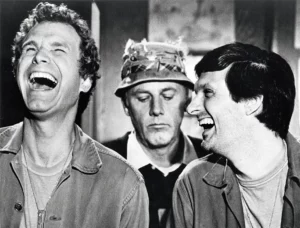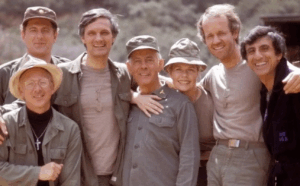When television historians debate the greatest sitcoms ever created, one name consistently rises above the rest: MASH. This groundbreaking series, which aired from 1972 to 1983, didn’t just entertain millions of viewers—it fundamentally changed what television comedy could be. While other shows made us laugh, MASH made us laugh, cry, think, and question the world around us, all within a single episode.
The Perfect Balance Between Comedy and Drama
What set MAS*H apart from every other sitcom was its unprecedented ability to seamlessly blend humor with heartbreaking drama. The 4077th Mobile Army Surgical Hospital became a stage where the absurdity of war met the resilience of the human spirit. One moment, you’d be laughing at Hawkeye Pierce’s irreverent jokes and pranks on Major Burns, and the next, you’d be confronted with the brutal reality of young soldiers dying on operating tables.
This wasn’t the sanitized, laugh-track-driven comedy that dominated television at the time. MAS*H dared to show that comedy could coexist with tragedy, that humor was often the only way people survived impossible circumstances. The show’s writers understood something profound: the funniest people are often those dealing with the darkest situations. The doctors and nurses of the 4077th used humor as a shield against the horrors they witnessed daily, and this authentic portrayal resonated deeply with audiences.
The series tackled subjects that were considered taboo for sitcoms: death, PTSD, alcoholism, racism, and the psychological toll of war. Episodes like “Sometimes You Hear the Bullet” and “The Interview” showed that television comedy could be as sophisticated and emotionally complex as any drama. This revolutionary approach influenced countless shows that followed, from “Scrubs” to “The Office,” proving that comedy doesn’t have to be shallow to be entertaining.

Characters That Felt Like Real People
The second reason MAS*H remains unmatched is its extraordinary character development. Over eleven seasons, we watched these characters grow, change, and evolve in ways that felt authentic and earned. Hawkeye Pierce wasn’t just a wisecracking surgeon—he was a deeply principled man struggling to maintain his humanity in an inhumane situation. His journey from cocky prankster to a man on the edge of psychological collapse felt real because the writers never took shortcuts.
Colonel Potter brought wisdom and stability to the camp, serving as a father figure who had seen enough war to know its true cost. Father Mulcahy’s quiet faith and compassion provided a moral center without ever becoming preachy. Margaret “Hot Lips” Houlihan transformed from a one-dimensional antagonist into one of television’s most complex female characters, showing vulnerability, strength, and tremendous professional growth.
Even supporting characters like Klinger, who spent years trying to get discharged by wearing dresses, revealed unexpected depth. His eventual decision to stay in Korea after the war to be with his Korean wife showed how profoundly the experience had changed him. These weren’t cartoon characters serving punchlines—they were fully realized human beings we came to know and love.
The chemistry among the cast was palpable. Whether it was the friendship between Hawkeye and B.J., the father-son dynamic between Potter and Radar, or the complex relationship between Hawkeye and Margaret, every interaction felt genuine. The actors inhabited these roles so completely that it’s impossible to imagine anyone else playing them.

Cultural Impact That Transcends Television
The third and perhaps most compelling reason MASH stands as the greatest sitcom is its unprecedented cultural impact. The series finale, “Goodbye, Farewell and Amen,” attracted 105.9 million viewers, making it the most-watched television episode in American history—a record it held for nearly three decades. But numbers alone don’t tell the story of MASH’s influence on American culture and television as an art form.
MAS*H arrived at a crucial moment in American history. The Vietnam War was tearing the country apart, and while the show was set during the Korean War, everyone understood what it was really about. The series gave Americans a way to process their feelings about Vietnam without directly confronting it. It showed the waste and futility of war while honoring the courage and sacrifice of those who served. This delicate balance helped heal a divided nation.
The show’s anti-war message was never heavy-handed or preachy. Instead, it let the reality of war speak for itself. By showing the human cost of conflict—not through statistics or political speeches, but through individual stories of suffering and loss—MAS*H made a more powerful statement than any protest ever could. It proved that entertainment could be both meaningful and popular, that audiences were hungry for content that respected their intelligence.
MAS*H also broke technical barriers for television comedy. It was among the first sitcoms to film without a laugh track (particularly in operating room scenes), trusting audiences to know when something was funny. It experimented with documentary-style episodes, real-time storytelling, and even an episode filmed entirely from a patient’s perspective. These innovations expanded what was possible in television storytelling.
The show’s influence extends far beyond its original run. Medical dramas and comedies continue to draw from MASH’s template of balancing humor with serious subject matter. Shows like “ER,” “Grey’s Anatomy,” and “Scrubs” owe a direct debt to MASH’s pioneering approach. The series demonstrated that genre boundaries were meant to be crossed, that comedy could tackle serious subjects, and that television could be art.
Moreover, MAS*H created a template for ensemble casts that television still follows today. The show proved that you didn’t need a single star—you needed a group of well-developed characters who could carry stories individually and collectively. This approach has become standard in modern television, from “Friends” to “The West Wing” to “Game of Thrones.”
A Legacy That Endures
Decades after its finale, MAS*H remains remarkably relevant. Its themes of friendship, survival, and maintaining humanity in impossible circumstances resonate just as strongly today. New generations continue to discover the show through streaming services, finding that its humor hasn’t dated and its emotional power hasn’t diminished.
What makes MASH the greatest sitcom of all time isn’t just that it was funny, though it was hilarious. It isn’t just that it was moving, though it could break your heart. It’s that MASH achieved something no other sitcom has matched: it was a complete artistic statement that honored both comedy and drama, that entertained while enlightening, and that made us laugh while forcing us to confront uncomfortable truths about war, humanity, and ourselves.
In an era of Peak TV with hundreds of shows competing for attention, MASH’s achievement seems even more remarkable. It proved that a show could be commercially successful while being artistically ambitious, that it could attract massive audiences while never compromising its vision. That’s a legacy that will endure long after the laugh tracks have faded and the streaming wars have ended. MASH didn’t just set the standard for sitcoms—it showed us what television itself could be.